Concert season- it’s one of the most exciting, nerve wracking, busy, and fun parts of our jobs as music educators. It never falls at a good time of the year and is guaranteed to be at least a little stressful. In every year of my career so far, I have been new to at least one building (including this year!). I’ve found some tips and tricks that have worked well in all of my positions regarding concert planning and execution. Although all of your concerts will be different, there are some tried and true actions that have helped to make my concerts successful regardless of the district, parents, students, demographics, and so on. Feel free to read, steal, and adapt what I am offering below!
Table of Contents
Concert preparation and communication
“By failing to prepare, you are preparing to fail.”― Benjamin Franklin
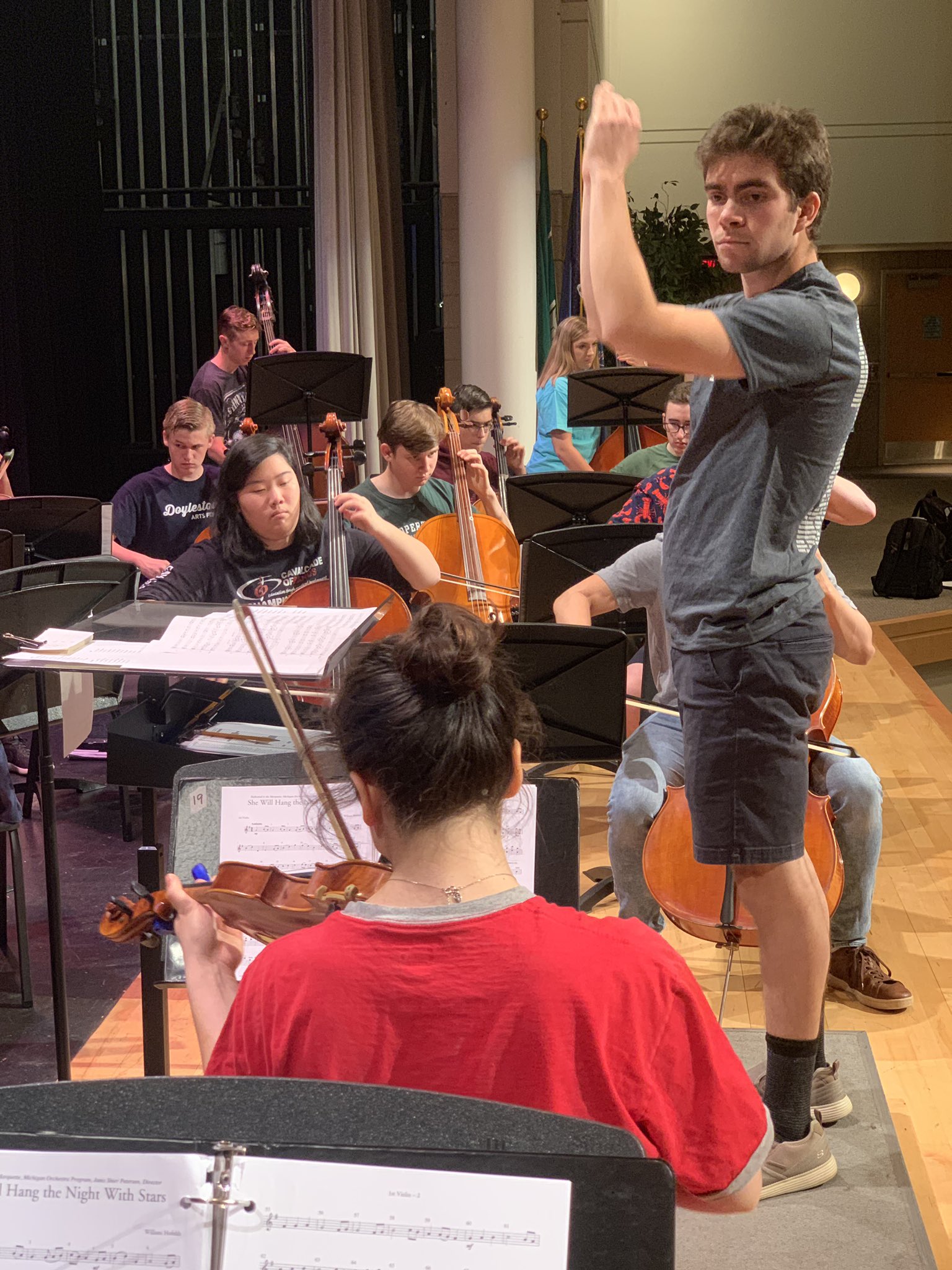
Nolan Conducting
Probably the biggest thing I learned very quickly is that you need to over do communication to students and parents. Concert preparation, in my opinion, starts as early as May prior to the year of the concerts. Send home a letter to your returning students with the dates. Have families block out the concert dates ASAP. If you send letters home to families, send the dates and times as well.
On a weekly basis, I send out a newsletter with all kinds of upcoming information. You can check that out here. During concert week, a lot of the things I would send out in the newsletter, I print and go over with students to send home. This way, there is no excuse for anyone to not have the information I send out. They can access it at anytime as long as they have the internet.
So…. what exactly do I send out? I try to give as many details that parents might want to know without giving them details they don’t need to know. On the reminders that go home, I talk about dress rehearsal times and requirements, concert report times and requirements, grading, uniform requirements, what students need to bring to the concert and my contact information should they have questions. You can check out an example of the very simple information that I share on this document here. It’s simple, there isn’t much to read, but I try to leave little room for questions!
At the high school level, I start to give students reminders about the concert and dress rehearsal for about a month in advance so they can check for appointments, practices, or other events going on. My concert and dress rehearsal are required for a grade with no wiggle room except for a death in the family or illness. Doctors, sports, clubs, etc. are not excused, no exceptions. You might be thinking… “gee that’s a little harsh”. I can understand why you might think that but over time, I grew to realize that only 2 times a year, I need all of my students to be in the same place at the same time. These are not weekly games, daily practices, or events that can be rescheduled. Students signed up for my orchestra just like they signed up for sports, clubs, and other events. They made a commitment and they need to honor it. In my case, this is also a graded event because we are a co-curricular class. I feel it is a fair expectation to have all of my students for these events regardless of what else they are choosing to include in their lives.
You might be wondering how I avoid conflict issues given my opinion about concert and dress rehearsal attendance. I learned about a “prior commitment form”, and idea that I used from Selby’s “Habits of a Successful Orchestra Director” book (a read I highly recommend!). A prior commitment form is given out when I give the dates out at the beginning of the year. At that time, and only at that time, students have the option to write down a conflict in which they will be unable to attend the dress rehearsal and/or concert. If they turn it in with a parent signature by a specific due date (about a week), they are excused from the dress rehearsal and/or concert. The events are not “maybe this will happen”. The dates they turn in are rock solid events that are unavoidable. For example, my fall concert was rather early this year due to a music department trip to Disney World. This conflicted with a family trip that was scheduled to Italy well in advance of the release of my concert dates. That was an excused absence as the student turned in the form within the given timeframe at the start of the year. This gives everyone the same opportunity to tell you upfront about conflicts and avoids the email the week before the concert stating that “Johnny has event X and we’re sorry I didn’t tell you earlier”. This has been one of the best things I have done for my program and event attendance. You can check out my form here.
Accepting help from others
“None of us is as smart as all of us.” –Ken Blanchard
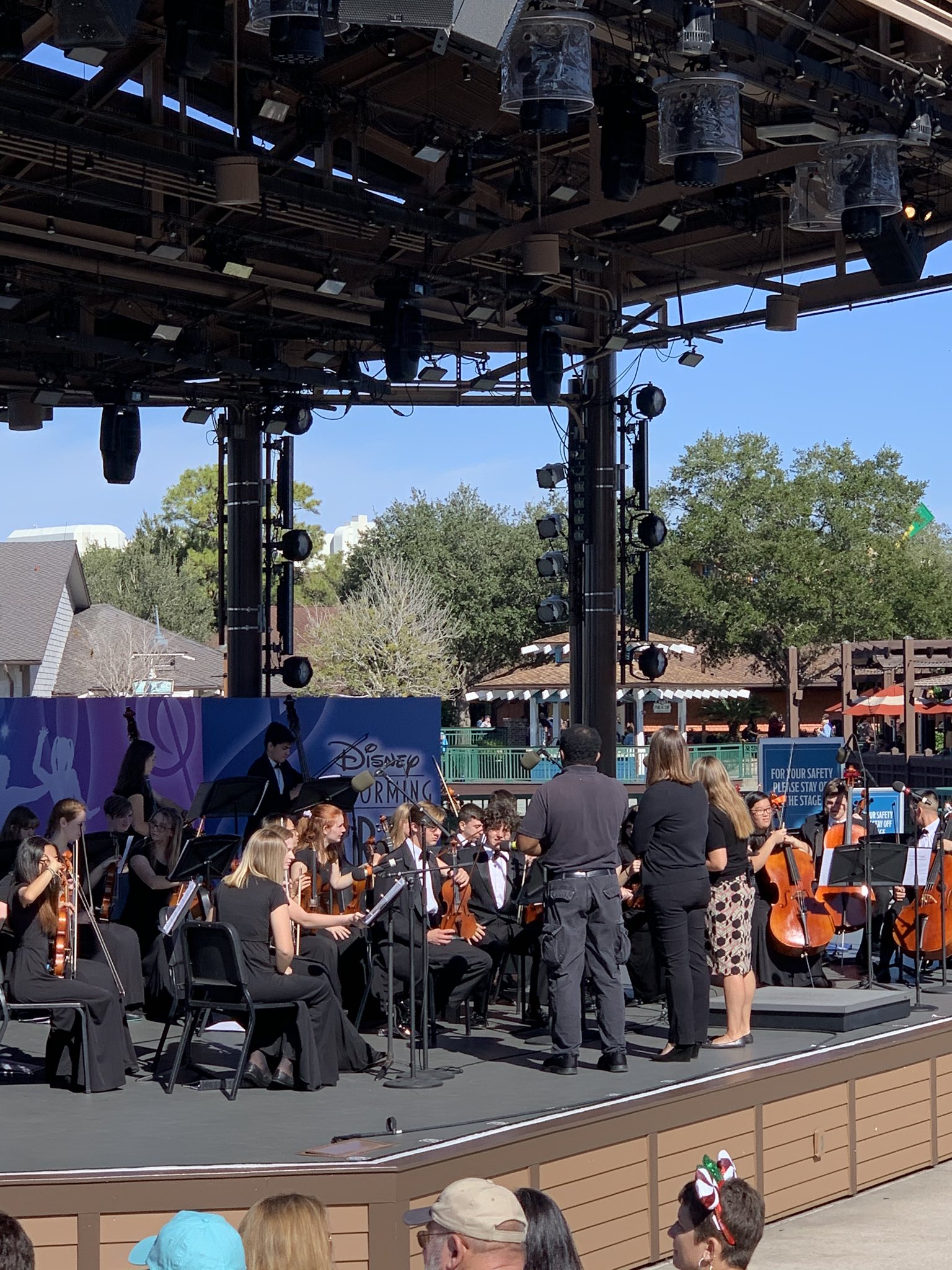
Marissa with her students performing in Disney World
In the book “Big Potential” by Shawn Anchor (which I would highly recommend you read as well), he talks about lightning bug research saying, “… lightning bug researchers discovered that when the fireflies were able to time their pulses with one another with astonishing accuracy (to the millisecond!), it allowed them to space themselves apart perfectly, thus eliminating the need to compete. In the same way, when we help others become better, we can actually increase the available opportunities, instead of vying for them. Like the lightning bugs, once we learn to coordinate and collaborate with those around us, we all begin to shine brighter, both individually and as an ecosystem.” He talks a lot in the book about working together to create a larger and more successful impact and this is just one example that illustrates his point.
Similarly, it’s important to remember in your first years as a teacher that you cannot do your job in isolation. There are so many moving parts to a concert such as lighting, sound, stage set-up, parking, security, etc. — the list goes on. In your first year, you won’t know who to talk to or how to accomplish a lot of what needs to be accomplished before the performance. ASK. FOR. HELP. Your fellow music teachers, if you have any, will be your main source of information. However, if you are the only teacher in the building, ask a secretary, custodian, or administrator for help with these things. Other teachers who host large events like art shows, sporting events, and so on might also be great resources.
Don’t make things harder for yourself- ask for the help you need, store the information for use later in your career, and then offer to help others however you are able. I could not do my job without the tireless efforts of other people. I know that’s a big statement. I cannot do MY job without the tireless efforts of OTHER PEOPLE. It’s true. Teamwork makes the dream work- seriously. Embrace the efforts of others and then thank them for all they do to provide your students with an incredible performing experience.
Using social media for preparation and performances
“Don’t use social media to impress people; use it to impact people” – David Willis
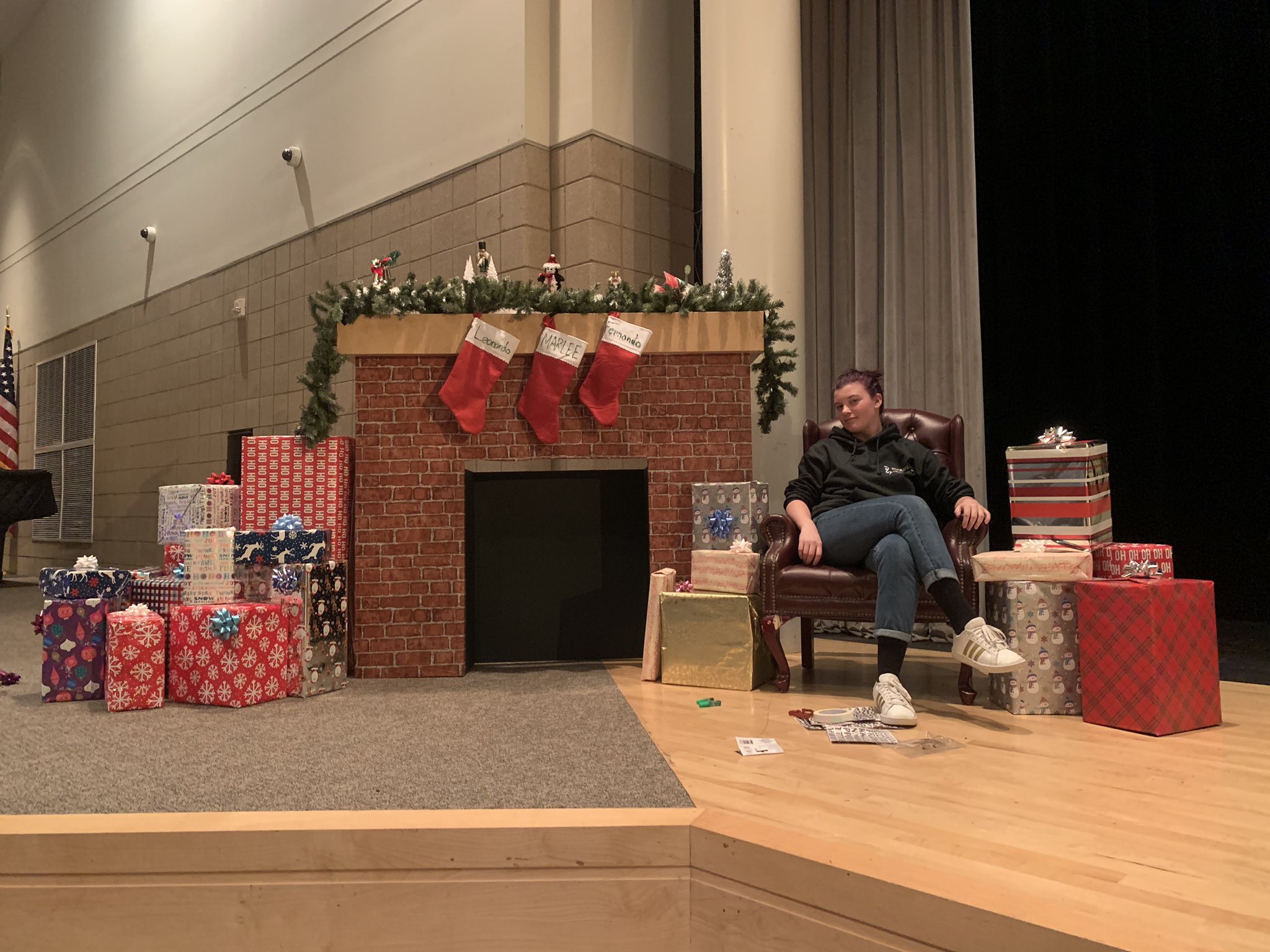
Marissa’s student with student-made decorations
I think that one of the best things for my ensemble is that we utilize social media avidly. There are a lot of reasons why social media can be bad for school activities but I’ve found it has a lot more good to offer if used properly. I use highly controllable forms of social media and they are all controlled through me. My thought on most things is that if it can get me fired, I want to be in control of it (aka, I don’t let my kids run it). In a world where social media has a large influence, I feel it is my responsibility to control what our organization puts out to our followers. Therefore, I use Instagram, Twitter, and Facebook. I have found that Instagram is where most of my students follow me, Twitter is where most of my administrators and fellow teachers follow me and Facebook is where the majority of parents follow me. I try to post with that in the back of my mind but I also tailor what I put on these platforms with this in mind.
You might be wondering how this relates to concerting. I have found that sharing information about the concert, concert preparation, and other exciting things leading up to the rehearsal help to excite my students and our community. I often post pictures and short video clips of concert preparation and rehearsals. I also use these photos and videos to honor the work students are doing particularly if they are working on solos or dedicating extra time to the concert. After the concert, I try to post a mix of videos, fun(ny) moments, and videos of big successes. This is used to celebrate the work of the students and congratulate them on their hard work. Because music has no real “victory” like winning a game, there can often be a slump after the adrenaline leaves. Students can be hyper focused on mistakes and only see the worst in a performance. I try to use social media to remove some of those feelings. I will say that I absolutely do a concert reflection (read about that next!) and allow students to analyze and take notes on their work. However, I try to not let that be the first thing that happens. Keeping morale high is important and keeps the students returning year after year. Finding the balance between critique and celebration is crucial but I have found there IS a happy medium. Social media can help you celebrate your students work publicly and critique it privately. You can check out our social media on the following platforms:
Facebook: Pennridge High School Orchestra
Twitter: @pennridgeorch
Instagram: @pennridgeorch
Managing nerves and expectations
“Being Nervous isn’t bad. It just means something important is happening”- Michael Jordan
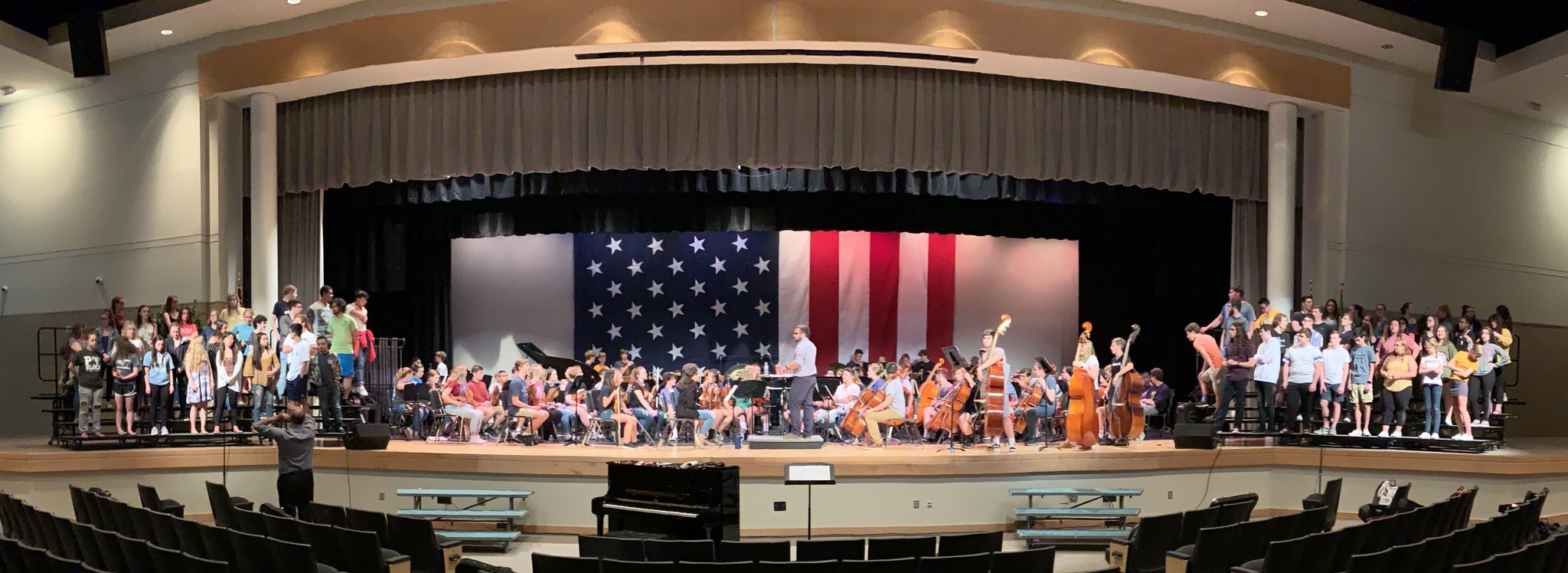
Marissa’s students at a combined concert
I’ll never forget my first time conducting a concert as a hired, paid orchestra director. It was a September concert, we were performing Capriccio Espagnol. Our concert master had worked tirelessly on the solo. I was new to the program, the Houston Area, and the state of Texas. I was scared and I was incredibly nervous. I spent a million hours finding an outfit and triple checked every aspect of that concert that was in my control. I was a mess.
… and then something clicked. This wasn’t about me. My nerves didn’t disappear at that conception of that thought but it allowed me to confidently walk on stage. I had to go out there and be calm, collected, and excited for the kids. It didn’t really matter if I was dying on the inside because I had about 200 students also excited and nervous looking to me to be their rock and their source confidence.
Just a few weeks ago was my high school’s fall concert. The choir director, who is in his 37th year of teaching, asked me if I was nervous and my response was “… yea. I guess a little unsettled” and he responded “Yea. That never goes away”. The thought of that was daunting to me… 30 more years of this stress and anxiety? Doesn’t it ever get easier? I thought back to my previous positions. I was once in a position where I was in five separate schools and completed 22 formal concerts a year. I don’t think I ever got nervous for those. So why was my one fall concert making me feel this way? To connect to the quote of this section, it just means something important is happening and that I care! What a concept- I care about how the students feel and what the community sees. I want the students to walk off stage feeling good and able to reflect on a great performance. I realized at that moment that nerves were good and healthy! I often try to switch up what I do at my concerts. Sit and play concerts can get stale for me and my students. But with new experiences come nerves but I’ve learned to love the nerves. It means something exciting is happening and, if my team and I have done the work correctly, something successful when all is said and done!
Providing students with opportunities to lead
“Unity is strength. . . when there is teamwork and collaboration, wonderful things can be achieved.” -Mattie Stepanek
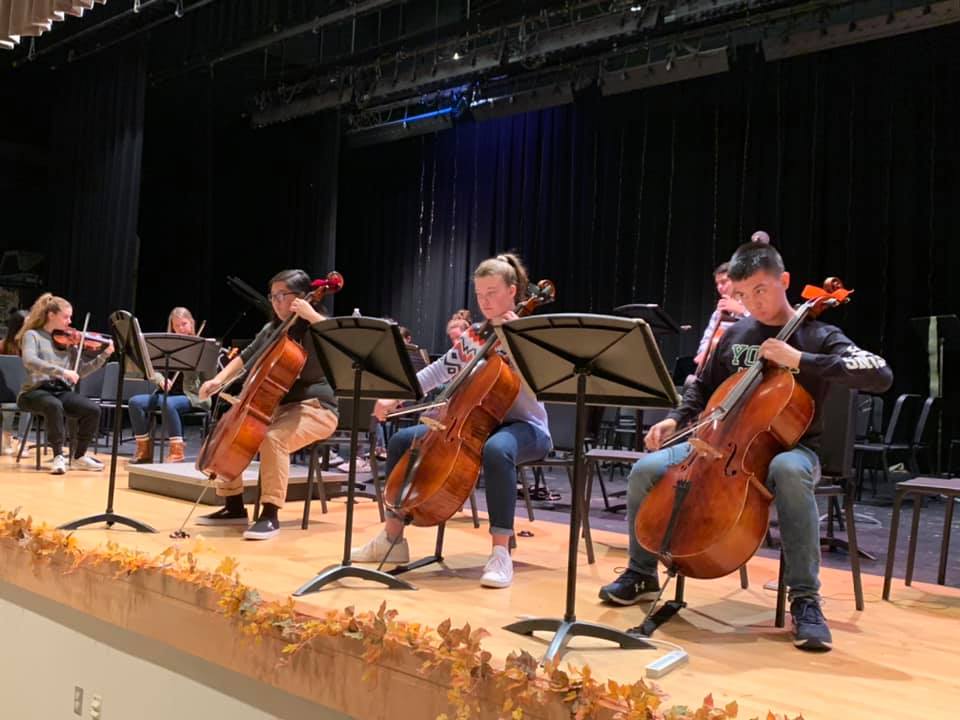 My first job was at The Woodlands High School just north of Houston, TX. The school itself was huge and, as they say, everything is bigger in Texas. The orchestra program and their concerts were no exception. While I have since left that position, I learned a lot in the short time that I was there. What was really amazing to me was that the concerts were so much more than sit and play concerts. While that’s essentially what was happening, there were extensive decorations, lighting, backdrops, and so on. If the show warranted it, they would all wear matching t-shirts that they had made just for the concert while the other times they were in their formal uniforms. What was even more impressive was that the majority of the preparation for the concerts was done by students (facilitated by the teacher). Students did everything from fold concert programs to build sets and decorations to place on the stage. If the t-shirts were being made, a student would do the design and so on.
My first job was at The Woodlands High School just north of Houston, TX. The school itself was huge and, as they say, everything is bigger in Texas. The orchestra program and their concerts were no exception. While I have since left that position, I learned a lot in the short time that I was there. What was really amazing to me was that the concerts were so much more than sit and play concerts. While that’s essentially what was happening, there were extensive decorations, lighting, backdrops, and so on. If the show warranted it, they would all wear matching t-shirts that they had made just for the concert while the other times they were in their formal uniforms. What was even more impressive was that the majority of the preparation for the concerts was done by students (facilitated by the teacher). Students did everything from fold concert programs to build sets and decorations to place on the stage. If the t-shirts were being made, a student would do the design and so on.
Why am I telling you this aside from the fact that this is a great way to take some work off your plate? The students a.) LOVE helping and b.) come incredibly invested in the concert experience by helping in these ways. When they actually help to create the product in all aspects (visual, musical, atmosphere, etc.) they own the entire experience more and have more to feel proud about. Instead of handing the concert experience to students, show them what goes on behind the scenes and use them to help you out! Kids are creative and will help you pick out decorations or even create them. They love to lend a hand and will stay after school to set everything up. Pro tip: if you were unaware, kids will do ANYTHING for food- buy them some pizza if they stay late to help you set up. It’s an easy and cheap way to get some help, thank them for their work, and bond with them on a personal level over a meal. My students also fold all of our programs and while it is a menial task, they are still proud that they were the ones who folded “the ridiculous number of programs”, as one of my students stated this year. Just like playing cards or conversing over a meal with your family, doing small tasks like folding programs are a great opportunity to talk about things beyond orchestra walls with your students and allow your students to get to know one another.
The entire experience of putting the concert together is unifying and special for students. It’s not just work, it’s a social experience. They talk with you and other students, perhaps students they haven’t yet spoken with, while they work. I allow students to put on (clean) music while we work- they dance, they sing, they have fun! Remember, this is a school music concert, not broadway, so the final product doesn’t have to look professional but the parents and other concert goers enjoy the effort and experience more when you do things like this.
Of course, the concert itself should also be a unifying experience. This is “game time” when everyone is playing not just for themselves but for the larger good of the group. If you’ve done your job, students want to do well for themselves AND their teammates. I’m a huge Penn State fan and alumni but I particularly love watching the football team. If you haven’t seen the HBO special on Penn State Football that was released earlier in 2019, I would recommend you watch it. It outlines all of the great things that the team does to create camaraderie and bonds between the team and coaches. While comparing sports to music is often scoffed at, I watch sports teams and learn how I can incorporate some of their activities and philosophies into my classroom. My ensembles don’t get to play multiple games a week- we get just one or two “games” a year so it’s incredibly important that when we are on stage, we are tighter than ever. I encourage you to take the necessary steps to ensure that these things are embedded in your program however you can in order to create a unifying concert experience.
Reflecting on performing experiences
“Celebrate what you’ve accomplished, but raise the bar a little higher each time you succeed.” – Mia Hamm

Marissa on stage with her students
Concerts can be a really brutal experience if you let them take that form. However, there is a pleasant outlook on concerts that I choose to take. There comes a point where you as the teacher cannot do any more than you have done to prepare students. You need to accept the progress that has been made and the result of everyone’s work and let the students enjoy their concert experience. I like to think of the concert experience as a celebration of the students’ work in the classroom rather than a test to see how well they can do something. If you and your students think of it simply as a presentation and celebration of what you have learned because you (collectively) want to share it with the community, that is significantly more enjoyable for everyone than trying to play everything perfectly. Newsflash: no one is ever going to play something “perfectly”. Mistakes are going to happen on your concert stage. However, there is a point as a teacher where you need to let the reigns go, tell the students to have fun and trust that they are going to do all (ok… most) of the things they worked so hard to create in the first place. I always tell my students to celebrate themselves and their teammates on stage. Without fail, the last thing out of my mouth before we begin a concert is “Have fun- you deserve it.” While I acknowledge that this mindset is not appreciated by everyone, I have found that students are more relaxed, focused, and self-motivated to do well when you let them take control of their work. An example: we were recently in Disney World performing a set at Disney Springs. We were playing Leroy Anderson’s Plink, Plank, Plunk! In the middle of the song, perfectly timed, one of my principal violinists whistled. I had a choice: be mad that he inserted a perfectly timed, slightly hilarious, and stylistically appropriate whistle when I didn’t ask him to. Or… enjoy the fact that the audience got a kick out of it and he was enjoying himself enough to “liven things up” as he put it. While I acknowledge allowing your students to do things like that can be a slippery slope, I kind of loved it. He was enjoying himself on that stage so much that he wanted to let others feel his joy and excitement. He was doing what I told him to do- having fun!
Expressing gratitude and creating a culture of kindness
“Showing gratitude is one of the simplest yet most powerful things humans can do for each other” – Randy Pausch
As an adult and educator that continues to gig in my spare time, I have found that I want to work harder for my friends and colleagues that are genuine about their gratitude towards me. Most of my gigs are compensated but some of them aren’t. The reason I choose to play gigs for free is that I am willing to do favors for those who are good to me and thank me for my work. It’s clear they value me as a person and musician and therefore, I’ll try my best to help them with their needs. I thought about this one day and realized the same was most likely true for students. At the end of my lessons, rehearsals, and concert, I make it a point to thank my students for their work. I thank them in class and I send home an email. Excessive? I don’t think so. I think it is important to make the students feel valued for the work they put in. I realize there are always going to be those few students who don’t add much to the ensemble, don’t practice, etc. However, the majority of students, at least in my experience, really do put in a significant amount of effort in some form. Maybe not everyone is practicing an hour a day but there are students who plan social events, do extra gigs, help me recruit and retain students, etc. There is a lot that goes on in a music program. I can’t do it without the help of many others, especially my students, and I use the concerts as an opportunity for me to show gratitude towards them for their work. We are a team and while I am the leader of that team, I’m still a member of the team just like they are and we need to take care of our team members.
That being said, concerts are learning experiences and should also be treated as such. I always record my concerts and have students do a reflection of their work. Perhaps the most important aspect of the reflection isn’t picking out what wasn’t correct but rather the element of goal setting. I always have students set a goal they’d like to see accomplished by the entire ensemble and then themselves. I’ve gotten fancy in past years and had students do rating scales that I could then quantify and give stats on. I’ve also just had them write a paper. Regardless of what they come up with or how you do it, the reflection piece of performing is crucial and I have found it to make a huge difference. Explore the various options and see what works best for your ensemble.



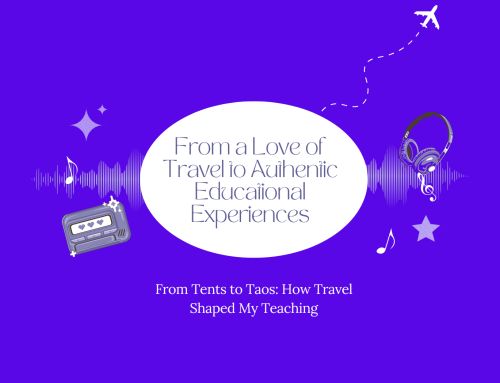
Leave A Comment